B.R. Stateham's Blog, page 22
November 21, 2011
One of the Best Out There
 Ever heard of a wise guy by the name of Jon Loomis? College professor, Wisconsinite; one of those Liberal Democrat-types that makes Conservatives pull their hair and gnash their teeth in righteous frustration.
Ever heard of a wise guy by the name of Jon Loomis? College professor, Wisconsinite; one of those Liberal Democrat-types that makes Conservatives pull their hair and gnash their teeth in righteous frustration.Hey! My kind of guy, Hortense!
Well it turns out this Commie-Pinko-Liberal-Revolutionary- English professor (Lordy! How vicious can you get, Hannibal!?) turns out to be a damn fine writer. He dabbles in the detective/mystery genre--but I have to say his books say more, far more, about life on the quirky/strange side of things than what you might find in the normal run-of-the-mill detective novel. There is a strong, and somewhat twisted, sense of humor that runs through his stories that make you smile, sigh, and say to yourself, "Yeah. Been there; seen that."
He has a character named Frank Coffin. Detective on the Provincetown, MA. police department. (by the way, it is Provincetown . . . not Providence. Get that straight, bubba. Or somebody named Guido will come knocking on your door. Trust me; I know. I met the guy yesterday.) A guy who has his own hang-ups which make him all too human. I like the guy.
I asked Jon if I could interview him. And be damned if he didn't say 'Yes' almost immediately. Apparently the guy likes me. Why I haven't the faintest fraken' clue. But I soon discovered I had a really fascinating talk with the guy. I'm fairly sure you're going to agree with me.
So here we go:

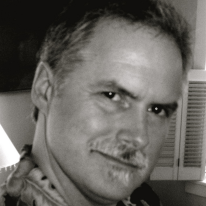 1. All right, I just have to find out; your fictional cop, Frank Coffin, where the hell did he come from?
1. All right, I just have to find out; your fictional cop, Frank Coffin, where the hell did he come from?
Frank's kind of what I imagine I'd be like as a cop, except he's smarter, a lot tougher and more brave, and, in some respects, luckier than I am. He's also really phobic: he hates dead bodies and he hates boats. I figured out a couple of years ago that his problem is really alienation: he's cut off from his past (all of his male family members going back generations died at sea, or in sea-related incidents), and he's cut off from his work-life to some extent. His dead-body phobia is the result of post-traumatic stress; his boat phobia isn't really all that irrational, considering. I'm not really phobic, although I don't like crowds very much. Or heights. Or flying.
2. High Season and Mating Season are the first two of the Frank Coffin series. What compelled an accomplished college professor like yourself to step into the deep murky waters of mystery/detective writing? And . . . as a side bar . . . how have your peers in academia taken to your alter-ego of being a writer of fiction?
Before I started writing the Coffin novels I'd published two books of pretty serious, high-art poetry (I still write and publish poetry: I've got a book in progress called Whiskey and Dynamite, about the end of the world). About ten years ago I started feeling that I'd exhausted the big subjects I'd been writing poems about: the deaths of several male relatives, including my father (heart attacks, mostly—not boating accidents), my divorce from my first wife, the partly voluntary, partly enforced loneliness of the writer's life, and my cardiac arrhythmia, which I lived with for fifteen years before I was able to have it surgically repaired. I was tired of all of it. I was tired of the tight little box that poetry can represent, too, and even tired of myself as a poet—I felt that I was doing the same tricks over and over. So, I started looking for a different kind of challenge. I've always been a fan of crime fiction: Chandler and John D. MacDonald and Patricia Highsmith and even Carl Hiaasen are literary heroes of mine (along with people like P.G. Wodehouse and Charles Wright, the Pulitzer-winning poet). I was at a fancy art colony in upstate New York—supposedly to write poems—and I wrote what would become the first twenty pages of HIGH SEASON in about two days. I thought, hell, this is easy! The book came out seven years later. So, not so easy as I thought. Still, fun!
As for my colleagues: some are more supportive than others, but I'm lucky to work in a department that's remarkably un-snooty about things like genre. Mostly they see the value in what I'm doing, although they continue to be surprised by the rate at which I'm doing it.
3. What I like about your novels is this wiry, sardonic, this almost passive-aggressive kind of humor that seems to permeate all of the books. Is this an artifice designed specially for the series? Or is this brand of humor an intrinsic part of you as well?
I like jokes, irony, one-liners. I have a very hard time being around humorless people. Frank lives in a funny place (Provincetown, MA, which is maybe the only majority gay/lesbian municipality in the U.S.), among funny people, so funny stuff happens. As in life, the really funny things are also often a bit painful. I try not to do slapstick unless it's absolutely necessary.
4. And speaking about humor and mysteries--just how difficult is it to blend the two together? Do you have any references from other writers who inspired you along this trail?
Maybe Hiaasen, although he doesn't really do mysteries per se (some of my Amazon reviewers would tell you I don't, either). I find the humor part inevitable—I'm not really trying to be funny, it just happens because my characters are funny, I think, and their situations are often funny. I don't actually think I could write a crime novel with a completely straight face. The trick is to balance the degree to which you're spoofing on the form with the expectation your publisher and your readers have for a satisfyingly plot-driven mystery. I'm pushing that envelope as hard as I can, but I still want to satisfy the basic form and give my readers the illusion, at least, that there's a mystery to solve.
5. Ah, now the tough question--in your opinion, do you think the academic world does/may someday/or never will-- give the genre you write any greater regard as being potentially excellent 'literature.' Or is this a bogus issue not worthy of discussion?
I think the day is already here in some English departments. At my university we teach lit courses in crime fiction, young adult, fantasy/horror, graphic novels, you name it, along with Beowulf, Shakespeare and the more canonical works. So why not teach those forms in creative writing, too? I understand the literary-fiction-only bias that most creative writing programs have, but more and more I think it does students a disservice. Almost no one writes literary fiction for a living anymore, but it's still possible to make a living writing popular fiction. Why not teach people how to do that, too?
6. You're soon to come out with the third Coffin installment called Fire Season. (to say I am looking forward to it is a mild understatement!) How does the future look for Frank Coffin past this third book? Can we hope Frank is going to age gracefully in Providence, Rhode Island (the setting for your books). Or are we in store for some violent, shocking end?
I hate it when writers correct their interviewers, but I have to do it here (sorry, B.R.). Frank lives in Provincetown, MA, which is a small town at the very tip of Cape Cod, not Providence, RI, which is the largest city in Rhode Island at about 178,00 people. Two very different places with similar names. People get them confused all the time, so it's not just you.
Frank's future is pretty fraught—the arsonist he's chasing ends up coming after him and his pregnant girlfriend. Also, did I mention that his girlfriend's five months pregnant? Trouble everywhere you look, in other words. Beyond FIRE SEASON I'm not really sure—a lot depends on the folks at St Martin's/Minotaur. If they want to keep publishing them, I'll keep writing them. Until I get bored and move on to something else, that is.
///
See. I told you you would find the interview fascinating. Remember! It's Provincetown . . . Provincetown . . . Provincetown!
His new book is called Fire Season. I'm not sure when it's supposed to come out--but put it on your 'I need to read this fraken book!' list. It'll be a good'un.
Published on November 21, 2011 11:23
November 17, 2011
Call Me Smitty: Carnival is now available
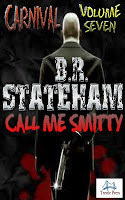 Here it is, kids.
Call Me Smitty: Carnival
. Number seven in the series. Seven installments total in the series featuring my hit-man specialist, Smitty.
Here it is, kids.
Call Me Smitty: Carnival
. Number seven in the series. Seven installments total in the series featuring my hit-man specialist, Smitty.'Been thinking of late about Smitty, and writing dark hard boiled/noir, and the components in what makes for a good short story. And heroes. Just exactly how do you define, design, create, write--a hero?
Is it an accident? Do writers deliberately go out and build, like some mechanical exacto set, a character and then slap the label 'hero' on him? Are heroes always Good and True Blue? Or . . . could a hero be normal. A person with as many weaknesses as he has strengths?
Even more interesting, could a hero be a bad guy? Bad in the sense of what society might label someone who does not stay within the accepted social parameters of society. Could a killer be a hit-man?
Guess so. Smitty seems to have developed a small following of fans who enjoy reading about his . . . uh . . . adventures. Hits, or rub-outs, would be more precise. Someone is going to get whacked in each of his stories in one form or fashion. And usually it's pretty violent.
And his fans--what few there are--seem to love it. One said she 'reluctantly rooted for him,' every time he eliminated someone. So . . . I guess . . . a bad guy can be a hero.
What about short-story writing. How do you define a good short-story?
Let me offer this definition. In the genres I write, namely hard boiled/noir and fantasy, they have to be a vivid snapshot of the darkness. Imagery in brevity--emotional undefined--unforgettable.
Let me give you some examples. In 'Call Me Smitty: Carnival' there is a short story entitled, Terrible. A man wants hires Smitty to kill his wife. Even insists on Smitty killing her in a certain fashion so he can stand and watch and enjoy every second of terrified demise. Brutal. Gruesome. Jacked with emotion. And Smitty? What of his response?
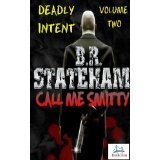 In volume two of the Smitty series (
Call Me Smitty, Deadly Intent
) Smitty rescues a young mother and her children from a husband/father intent on killing them all. They're standing alone, defenseless, in a driving rain on a busy street corner watching traffic go by and knowing, each and every one, they are about to be slaughtered.
In volume two of the Smitty series (
Call Me Smitty, Deadly Intent
) Smitty rescues a young mother and her children from a husband/father intent on killing them all. They're standing alone, defenseless, in a driving rain on a busy street corner watching traffic go by and knowing, each and every one, they are about to be slaughtered.From out of the driving rain Smitty finds them. Like some mythological creature he materializes out of the diluge and saves them. Makes sure the husband never bothers any of them again in.
But what made this man the way he his? How do you become an 'anti-hero hero?' Could you write a short story that describes how a good man who once believed in being honest, thoughtful, caring, and loving suddenly turn into the hard edge, emotionally dead kind of soul a hit-man needs to have in order to succeed in his new profession.
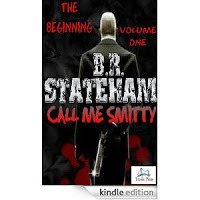
And can you do it with brevity? Yes. In the story called Call Me Smitty, found in the first volume of the series (Call Me Smitty: the Beginning) a cop who once called himself Johnny is betrayed. Betrayed ruthlessly by his wife and his brother. Johnny slips into an insane, murderous rage.
Does he kill his brother and his wife? Ah . . . the first portion of the story certainly sets the reader up for that conclusion. But . . .
And that's the other part about writing a good short-story. Set the reader up for one expectation. And then throw them into an entirely different bone. What they think is going to happen and what actually happens turns out to be two entirely different events.
In each of these examples I tried to write verbal portraits of vivid clarity in as few words I could possible muster. For me, that's a great short-story. Clarity. Brevity. Emotional. Vividly memorable.
Oh . . . I know, I know: sometimes I am so full of myself! Sometimes I sound like some schmuck who is blowing his horn much too loudly in a crowded building. But that's okay. Someone once told me, "If you don't believe in yourself, who else will?"
That thought has stuck with me ever since.
Published on November 17, 2011 08:34
November 15, 2011
And Now a Word From Sam Lang
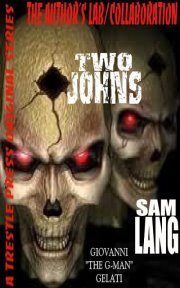 All right, boys and girls, time out for another friendly commercial from the growing menagerie of writes from Trestle Press. I know . . . I know . . . it seems like you can't shake a tree or kick a can down a dusty road without ten or fifteen Trestle Press writers falling out of the sky and littering the place. But that's the FUN of it all! Really!
All right, boys and girls, time out for another friendly commercial from the growing menagerie of writes from Trestle Press. I know . . . I know . . . it seems like you can't shake a tree or kick a can down a dusty road without ten or fifteen Trestle Press writers falling out of the sky and littering the place. But that's the FUN of it all! Really!All of the writers at Trestle Press are new. Most have published for the first time. All of them write short-stories. A few (like me) write both short stories and novels.
But the fun part is this; it's a new publisher. It's a new market (the ebook market) AND it's the beginning flames of the rebirth of the short story! I mean . . . to be on the ground floor for this renaissance is kinda . . .you know . . . exciting.
So meet Sam Lang. Another Trestle Press Writer. Another one of those guys who delves into the horror and macabre. Mostly. He's written a little blog about a new story coming out I thought I might share.
So here it is, amigos:
A Word from the Reprisal Travel Bureau
If you are looking for that perfect getaway with quaint shopping, unique dining and lots of history, then come spend a weekend in Reprisal.
Recently making national headlines, the secluded town of Reprisal is fast becoming known as a destination for history buffs and the just plain curious. Newly elected Mayor Emma Bjornstrand has revitalized the now infamous downtown district. Visitors can tour the town jail and celebrate the grand opening of the wax museum.
For breakfast, lunch or dinner, be sure to stop into the Coffee Shoppee! You might see Mayor Emma still waiting tables. Sample some home-made meals named after our local celebrities.
After a long day of shopping at our exclusive stores, check in to Madam Yulissa's Bed and Breakfast. Space is limited, so reserve your room early.
The truly adventurous may want to make the short trek down the old back road to the infamous Edgar King Penitentiary. Tours are given daily, but overnight excursions are only offered on Saturdays. Some lucky guests could sleep in the actual cells occupied by Reprisal's most notorious.
With all that awaits, the only thing to ask is "Do you know when YOU get to Reprisal?"
Sam Lang, (Severed, A Vampire's Guide to Sex) is the author of Reprisal, an ongoing digital short series from Trestle Press. Please visit LangsReprisal.blogspot.com and Facebook.com/LangsReprisal for more information. Sam is certain you will be dying for more Reprisal, so he is willing to offer Chapter 1: Making Plans, Making Memories for FREE to any brave souls that ask for it. Email SamLangAuthor@gmail.com. You can find all of Sam Lang's works on Kindle: Amazon US ( http://www.amazon.com/Sam-Lang/e/B005N8WPVG/ref=ntt_athr_dp_pel_pop_1 ) and Amazon UK ( http://www.amazon.co.uk/Sam-Lang/e/B005N8WPVG/ref=ntt_athr_dp_pel_pop_1 )
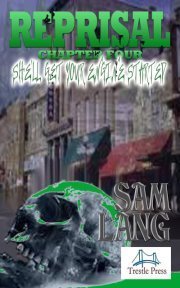
Reprisal
Reprisal is a dying town built on secrets and haunted by a mysterious shadow since its beginnings. Eddie Newport must survive one night in this town with his oldest friend as a bus full of escaped murderers breaks down on Main Street. Read the full story as a series presented by Trestle Press.
Published on November 15, 2011 11:02
November 14, 2011
And Now For Something Different
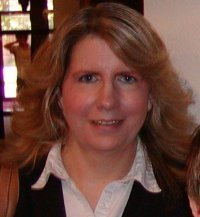 And now for something different. It seems as if everyone interviews writers. But there are other people involved in the writing profession. People who have a direct link into making a writer shine brightly in a dark theater filled with millions of other struggling writers. I'm talking about publishers, lit agents, book store owners, ad men . . .
And now for something different. It seems as if everyone interviews writers. But there are other people involved in the writing profession. People who have a direct link into making a writer shine brightly in a dark theater filled with millions of other struggling writers. I'm talking about publishers, lit agents, book store owners, ad men . . . And book reviewers.
Michelle Vazquez is a blogger/book reviewer. I'll tell you right up front that Michelle was gracious enough to read some of my material and right some nice reviews about them. She is, as well, a writer herself.
Later on in another blog, we'll interview her as the up-and-coming-writer. But for now, let's talk to her wearing her other hat--that of the blogger/reviewer.
I met her thru Facebook. (like, Dude! Who haven't I met thru Facebook!?) She is an articulate voice who justly deserves an interview. I thought it'd be interesting to see how a book reviewer ticks. So I asked her if she'd agree to an interview. She did . . . . so let's get right to it.
1. I am assuming your day job is still being the account you said you were. If so, tell me; where do you find the time to do so much reading?
Yes, I work full time as an accountant for a local government agency. As for reading, it is my favorite pass time. I watch very little TV. I find reading much more entertaining.
2. What made you decide to review books? A compelling drive from deep inside you--or just wanting to share your opinions with others?
It started when the whole blog trend started and all of my online friends were creating blogs. One day I read a fabulous book that really "wowed" me, and I posted about it. I started doing that, and then I found a blogger program where they would send you free books if you would post about it. It was from a publisher that I was already reading, so I jumped on it. And, then there were more and more….and now I've had to cut way back. Eventually it can get really overwhelming!
3. Are you a generalist in tastes? That is, do you read everything? A full spectrum of fiction? Are do you have your preferences. If you have preferences, what are they and why these over something else?
I read most everything. I prefer something with some degree of mystery/suspense in some form or another. I like something that grabs me and hooks me. But, that being said, I still read a little bit of everything, including even a few memoirs and nonfiction. My favorite is probably horror. I grew up a huge Stephen King fan. I cut my teeth on his old stuff. I'm not such a fan of his new stuff anymore. I think his writing lost something, but I'm still a big fan of horror.
 4. The $64,000 question: what makes a good book? Character? Plot? The suspense? The mood? And a follow up question--do the principals of what makes a good book, say, in something defined as 'chic lit' the same thing for something defined as 'dark noir?'
4. The $64,000 question: what makes a good book? Character? Plot? The suspense? The mood? And a follow up question--do the principals of what makes a good book, say, in something defined as 'chic lit' the same thing for something defined as 'dark noir?'You're asking a purely subjective question. A book would really have to be bad for me to call it a "bad book". Authors put so much work and so much of themselves into their work, and here's the thing; I might not like a book, but someone else might love it. That's part of what I try to do on my blog. I try to tell people enough about the books that I read so they can make their own decision about whether that book would be something for them. One of my pet peeves is when a reviewer gives a book a 1 star review because they didn't like it.
As for your specific questions, characters are really important to me. I also think that's a personal thing, though. However, if I don't care about the characters, it really doesn't matter how great the plot is, I'm just not going to care. I have to care about the character. And, as I said before, I really like suspense that keeps me hooked and turning the pages. But, that's all subjective. There are a lot of people who prefer completely different types of books.
5. With epublishing apparently taking over the publishing world, what role does a book reviewer play in today's world? Should this role increase in importance or remain relatively the same in stature?
I honestly don't know. It has really grown just since I started doing this in 2009. I have to constantly turn people down because I'm buried in books. I wish I could read them all, but I just can't. It has become a growing trend for authors to contact the bloggers themselves about new releases and offer review copies, and there are still the PR companies that do blog tours that are very busy. Before I started doing this myself, I actually had some blogs that I followed and that's how I found out about new books. I think there are still a lot of readers who do that.
6. When should a book reviewer become the critic? How difficult is it to give a bad review to something you've read? Should a reviewer only be positive in their views, or should they have the freedom to express either praise or criticism--or both--for a piece of writing?
I try to network with other book bloggersLOL. I'm not comfortable with negative reviews, so I will choose to not post on a book that I didn't like. However, I don't have a problem with other book bloggers who post negative reviews, if they do it in a respectful way.
 Michelle Vasquez is an avid reader who writes book reviews for her website:
Life in Review
. She reads and reviews everything from Amish fiction to horror, and everything in between. She has two digital short stories with Trestle Press: Second Hand Bookstore and 'Til Death Do Us Part. She works full time as an accountant and lives in Texas with her two teenage sons. http://lifeinreviewblog.com/
Michelle Vasquez is an avid reader who writes book reviews for her website:
Life in Review
. She reads and reviews everything from Amish fiction to horror, and everything in between. She has two digital short stories with Trestle Press: Second Hand Bookstore and 'Til Death Do Us Part. She works full time as an accountant and lives in Texas with her two teenage sons. http://lifeinreviewblog.com/
Published on November 14, 2011 07:00
November 11, 2011
'Eleven From The South Side' is available!
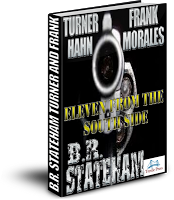 It's finally available! Eleven From the South Side. The eleven short-story collection of Turner Hahn/Frank Morales stories. You know what I am talking about. I've mentioned Turner and Frank to you hundreds of times. Well, it's time to let you know you can go off and discover them for yourself. All eleven stories.
It's finally available! Eleven From the South Side. The eleven short-story collection of Turner Hahn/Frank Morales stories. You know what I am talking about. I've mentioned Turner and Frank to you hundreds of times. Well, it's time to let you know you can go off and discover them for yourself. All eleven stories.The price is $4.99--not bad considering you are getting a download the size of a fairly decent book. Frankly, I'm pleased as punch. I've said it before and I'll say it again; Turner and Frank should be discovered. They're truly well developed characters. They have strengths. They have weaknesses. They're human.
But in the dark back alleys of the underworld, they're two cops who are honorable, honest, tough, and determined.
But if you're looking/buying something in the mystery-detective genre, by this and then by the other offering I have out now. Two different kinds of cops. Cops who, by the way, come out of the same precinct as Turner and Frank. The South Side. But these two are different. They're not the well-oiled, smooth running machine like Turner and Frank. They're a bit rougher around the edges. Have a few more issues to resolve. Find each other a bit uncomfortable to be around.
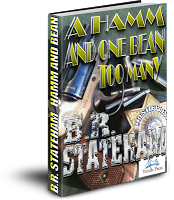
Actually, the two want to kill each other. Neither Marissa Hamm nor Mike Bean are, shall we say, the nicest people to be around. Hamm's sarcastic tongue will carve you up like a Thanksgiving turkey. Bean's ability at wielding insults around is equally deadly. Individually each one of them are persona non grata at South Side. Together they are still persona non grata--but at least they work fairly effectively together as homicide detectives.
They're first set of adventures is called A Hamm and One Bean Too Many. The first two stories of the series will set you back all of .99 cents. (budget-buster, I know)
Still, as the saying goes, if you like character-driven stories I'm pretty sure you won't be disappointed in either one or both of them.
Give'em a try and tell me what you think.
(to the right you can click on their covers and go straight to Amazon. Just saying . . . )
Published on November 11, 2011 12:05
November 9, 2011
Another British Bloke Book Meister
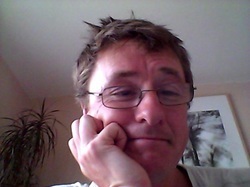 Ian Ayris. House-husband, professional counselor, writer or really quirky British crime stories. Emphasis quirky.Ian is another one of those up-and-coming writers of crime fiction, British style. God knows why I seem to know so many of them. Maybe it's because I like their brand of crime and humor. Maybe it's because I'm cruising the 'Net too much and run across guys like this and strike up a conversation. Maybe it's because one bad penny (me) attracts other bad pennies (not that I'm saying your bad, Ian. You're 'bad' in a good way! I mean to say . . . oh, what the hell). Whatever it is, I'm damn glad I know the guy. He, along with the other Brits I know, are some fine writers worthy of attention. Not only that, they're good men to know.
Ian Ayris. House-husband, professional counselor, writer or really quirky British crime stories. Emphasis quirky.Ian is another one of those up-and-coming writers of crime fiction, British style. God knows why I seem to know so many of them. Maybe it's because I like their brand of crime and humor. Maybe it's because I'm cruising the 'Net too much and run across guys like this and strike up a conversation. Maybe it's because one bad penny (me) attracts other bad pennies (not that I'm saying your bad, Ian. You're 'bad' in a good way! I mean to say . . . oh, what the hell). Whatever it is, I'm damn glad I know the guy. He, along with the other Brits I know, are some fine writers worthy of attention. Not only that, they're good men to know.
He has a novel coming out in March called Abide With Me. Two school chums who grew up together in the same rough, hard neighborhood that seems to be a universal motif all over the world. Poignant. Powerful. The first, I predict, of a number of excellent novels to come out of this man's imagination.
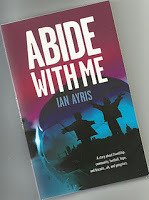 And you get to meet the guy before he turns into a super star. Say! We may be making history here!!I thought I would ask him a few questions--you know, throw him into a hard wooden chair; aim a 1000 watt flood light into his face. Maybe use a rubber-hose on him when he started to clam up. I mean. . . what the hell. We're friends! And in the end, what are friends for but to give them a friendly third-degree every now and then.
And you get to meet the guy before he turns into a super star. Say! We may be making history here!!I thought I would ask him a few questions--you know, throw him into a hard wooden chair; aim a 1000 watt flood light into his face. Maybe use a rubber-hose on him when he started to clam up. I mean. . . what the hell. We're friends! And in the end, what are friends for but to give them a friendly third-degree every now and then.
So here we go;
1. You have a novel coming out. Tell us a little about it.
Well, short of repeating the blurb . . . here's the blurb . . .'3rd May 1975. Eight year old John watches his beloved West Ham win the cup, whilst at the same time, Kenny tumbles out the house opposite, blood all over his face.
Fourteen years later, both boys' childhoods ripped apart in the broken streets of London's East End, John and Kenny find themselves frontin up local gangster, Ronnie Swordfish. John's got a lifetime of hurt to put right – for him and for Kenny.
But with John layin on the ground half unconscious, and Ronnie with a sword to Kenny's head, whatever way you look at it, it don't look good. ABIDE WITH ME is the story of two boys forced to walk blind into the darkness of their shattered lives . . . . . . and their struggle to emerge as men.'2. How much of this novel is fiction and/or fiction based off your own experiences.Much of the novel is centred around the childhoods of the two boys – and much of that based upon my own. When I say based upon my own, I mean more the nostalgic elements of growing up in the seventies – the pop culture stuff – and themselves and the atmosphere, those sort of things. The school sections are are based on my secondary school and many of the incidents and teachers in the school are based on fact. Another key element of the book is the football culture. By football, I mean the proper sport of football, not that silly rugby type wotsit you play in your neck of the woods, B.R. ;) I've been watching my local football team – the mighty Dagenham and Redbridge – for much of my life. For the book, I just transplanted these experiences of standing on the terraces to the bigger stage of West Ham United. All of the West Ham stuff in the book is factual, although described through the eyes of John, so it has a certain bias.3. When you write, how does the process begin AND how do you keep that process goingMy writing process is simply to sit down at a keyboard, take a deep breath, and startyping. After a couple of sentences of rubbish, I link into what is being played out
inside my heard in terms of the story I want to tell, and simply transcribe what I see and
hear. And it goes on like this until I decide to 'turn it off'. End of a chapter, normally. 4. What are those traps and pitfalls which keeps you from writing. Or, to put it another way, what traps and pitfalls suddenly crop up that stops you from writing?I'm a house-husband by day, so have my wifely duties to fulfil in the way of cleaning, shopping, taking and picking the kids up from school, etc. It's only been the last few weeks since the youngest has started school, so am currently revelling in my new-found freedom. I'm also studying for a degree in English Lit., so have to makesure I leave time for that side of things. I'm a rubbish organiser. Lists everywhere, but
soon as I write one, I lose it or write another one that's better or decide to tidy up the shed or something. If I've got nothing talking to me in my head, urging me to tell their story, I simply cannot write.5. In your own words what is the definition of a great story? A great writer?A great story? A great writer? For me, it's when a writer is able to transport meinto a world of their own making, where I hear the characters speaking, see the painor the joy in their eyes. That's it, for me.6 . Several times I've heard you mention the difference between American and British noir/hard boiled writers. Several times you've mentioned humor Always an interesting one this, B.R. Before I answer the question, I think it best if I say that any sort of generalisation in a subjective media is bound to overlook the exceptions. With that out of the way . . . I think one of the differences I've noticed whilst being in this fabulous online crime fiction/noir scene the last couple of years, is the seeming leaning towards plot-driven stories from the US and character-driven stories from here in Old Blighty. I'd like to stress again, I'm not saying one is better than the other, just something I've noticed. Being a more introverted race of beings – again generalising hugely – I mean, Lee Child, for example – perhaps us Brits are more comfortable looking inward, whereas, again generalising hugely, the American writers seem to be much more comfortable dealing with, say, the self-promotion angle of being a writer than we Brits are. I've drifted onto a different point there, haven't I. Sorry about that. But I think there's some relevance in there somewhere. And there is also the cultural thing. Being a qualified counsellor I have seen many clients that spend a lifetime coming to terms with expressing emotion. It's not the stiff upper lip thing anymore – it's the fear of what might happen if all that emotion bursts out. Writing is a safe way of expression that emotion, which is one reason, perhaps, British writers lean in that direction rather than intricate plotting. And, to be honest, the material you've got over in the US to work with is in far greater degree than over here – guns, drugs, dozens of serial killers roaming the country at will all at the same time, and a much stronger sense, I feel, of justice and heroes as something to aspire to. Just want to add, my mate Chris Benton – one of your compatriots – writes the best character driven stuff I know. See, my theory is full of holes :)
7. Now compare British writers in this genre with writers coming out of the rest of Europe. Are their any differences? Similarities? I'm ashamed to say, B.R., I can't put me name to reading anything on the fair continent of Europe. It's something I intend to put right, so if anyone has any suggestions of where to start, I'd much appreciate it :)8. In today's publishing world we see a lot of editors/publishers wanting writers of fiction to come up with a continuing series. What do you think of this? Do you write a series yourself?I think a series makes a lot of sense for editors/publishers to push. If one book with one set of characters or character gets a committed readership, then another book with the same set so of characters or character has a fairly high chance of dragging those readers along with it. Also, if a reader comes late in the game to the series, there is a whole back catalogue to buy. For me, I've never thought I've writing a series. All my stuff seems to have endings where a sequel is pretty much beyond the laws of physics. I have, however, written two stories with self-employed hitman, Charlie Splinters, as the main character. The first story – SMALL PRINT – will be in the 2012 edition of The Mammoth Book of British Crime, and the second story, HARD TIME, placed fourth in The Watery Grave Invitational this year and will be appearing in the forthcoming collection BRIT GRIT 2. I've written another story for the forthcoming OFF THE RECORD collection from Luca Veste where I've since used the unnamed narrator of that story as the main character in a novella I am currently working on.So perhaps I've been dabbling with writing a series, or two, without even realising. . .9. What are your thoughts on the conflict between creating plot versus creating vivid characters. Which one is more important? Which one do you think is your strongest and weakest areas?
Firstly, I'd have to say, I'm very much from the creating a story from a vivid character camp. Once I've got a vivid character sitting inside my head, talking to me, they tell the story themselves. I've no real input. For me, a plot can involve something as simple as a desperately paranoid psychopath going down the road to buy a bag of chips. It's all on the inside. That, for me, is where the plot is.I find it almost impossible to plan anything in my writing, hence putting something together as intricate as a plot – beyond me, I think.
10. Genre fiction versus the classic definition of Literature. In your opinion, why is the former so casually dismissed by academia and the latter so angrily dismissed by the majority of the reading public?
Now, I love genre fiction – mainly crime fiction, of course – and I love classic literature. Is there room for both? Of course there is. As in all things, holding on to a label merely precludes you from experiencing what feels most threatening to the existence of that label. For me, Dickens could be considered a genre of his own, just as Raymond Chandler and James M. Cain are two writers that easily fit the definition of the 'literature' camp.
I think categorising in any form, for me, smacks of compartmentalism. And compartmentalism merely leads to prejudice and seclusion. Remove the labels, and great books are just great books.
11. The writing process: do you pace yourself by setting goals like writing so many pages a day? So many words a week? Or do you write when the urge hits you?
Not an easy one, that, B.R. Sort of a bit of both. I can't plan – anything. So the words per day or words per week thing doesn't really happen. My process, if that's not being too pretentious, is normally I get a rumbling of voices inside my head – all fighting for attention. I've learnt now, rather than sit down straight away and start typing – to wait until the one voice with the greatest need becomes the clearest. Sometimes it takes a day, two days, two weeks – it doesn't really matter. However long it takes to get that voice clear in my head. Sort of like tuning a radio. Once I've got it clear, I sit down and listen and type. Till that bit of the story – if it's a book – or the whole story, if it's a short, until it's finished.
That's it, really. A bit mad, I know. But there you have it :)
12. What do you say to this statement, "The greatest (_pick a genre/style) book has yet to be written."'The greatest hardboiled noir relationship counselling book has yet to be written.'
An up-and-comer, boys and girls. You should keep an eye on him. You can jump into his blog, called (succinctly, by the way) The Voices in My Head. Or you can find him in Facebook, Twitter, and maybe about a thousand other sites on the 'Net. Wherever you find him, remember his name. He's a good one.
(by the way--the look of this blog looks 'choppy' to say the least. Blame that on me--a tekkie I am not. And the tech I use to keep this site running (me) decided to take a two-week ski trip in the Sahara. In other words, buddy . . . blame it on me).
Published on November 09, 2011 10:01
November 7, 2011
Musings
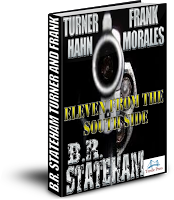 Hmmmm . . . .been thinking over the weekend about this. About the two characters of mine, Turner Hahn and Frank Morales. The boss at Trestle Press asked me to write a short blog concerning my 'journey' in developing these two down through the years. So I whipped up something for him and sent it off to him.Honest words, mind you. Some thoughts and emotions truly felt. But over the weekend I've been, off and on, mulling over what I said about Turner and Frank. I realize there are some points I should have mention . . . or at least emphasised, in more detail.
Hmmmm . . . .been thinking over the weekend about this. About the two characters of mine, Turner Hahn and Frank Morales. The boss at Trestle Press asked me to write a short blog concerning my 'journey' in developing these two down through the years. So I whipped up something for him and sent it off to him.Honest words, mind you. Some thoughts and emotions truly felt. But over the weekend I've been, off and on, mulling over what I said about Turner and Frank. I realize there are some points I should have mention . . . or at least emphasised, in more detail.
For instance. The 'buddy story' part. Yeah, sure; the stories featuring Turner and Frank are designed to be relatively decent 'whodunits.' The novels are set up to feature two cops who are overwhelmed almost in working multiple homicide cases. As, I'd bet in larger cities, a lot of homicide detectives face on a daily basis. Two or more homicides that are unrelated. Each a separate case that forces the two to hop from one to the other as they work their way through them all.
Sounds confusing, I know. But I actually think it works.
The short stories are different. It's one odd-ball crime after another they hustle around with. There's always a twist about'em. They set you up to expect on thing and then trip you up in the end somehow.
But in the 'whodunit' complex in writing the stories one aspect of the Turner/Frank sometimes is overlooked. The buddy part of their relationship. I purposely sat down to write a buddy story. Two guys who are genuine friends. And that in itself posed a problem. How do you write a buddy-novel where both characters are equals. Think of Sherlock Holmes and Dr. Watson. You could say those two in their stories are definitely friends. But is Watson equal to Holmes intellectually? We know the obvious answer.
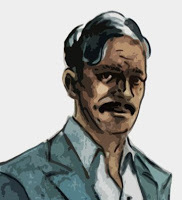 Holmes and Watson are just one example of what I am trying to say. I'm sure you can think of other examples as well. Hundreds of the. (Turner Hahn)
Holmes and Watson are just one example of what I am trying to say. I'm sure you can think of other examples as well. Hundreds of the. (Turner Hahn)So how do you do it? How do you write about two characters who are decidedly different in their personalities yet equal to each other in their abilities? I actually don't know. But I try.
The second thought that crossed my mind concerning these two and their series I'm writing was about the stories themselves. Writing the 'whodunit' part. Let me be conceded enough to suggest that I am trying to write more a complex story featuring emotions and personalities as compared to the current headlines we all read about on a daily basis.
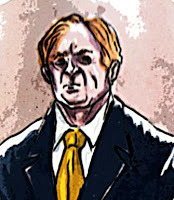 (Frank Morales)
(Frank Morales)Just what are the forces which make someone want to commit murder? When does a personality bend to the point it breaks? Why do people continue to believe they can commit a murder(s) and get away with it? No . . . I want come out and say I write psychological novels of murder and mayhem. But in my own way I do like to look at the motives which makes a person commit violent crime.
Sometime this week (?) a collection of eleven short stories are going to come out. Called Eleven from the South Side. Eleven stories that show Turner and Frank at their best. Tough, hard, determined. Yet with a dry . . . one could say even droll . . . sense of humor. Friends. One relying on the other in every situation they find themselves in.
Sometime later on a novel is coming out. Entitled A Taste of Old Revenge. Two homicide cases. Each as complex as the other. Neither related. One involves a lot of spies and slips into the horrors of history. The other is about greed. Plain . . . simple . . . murderous greed.
These two guys are old friends of mine. Yeah, sure. They are fictional characters who live in my mind. But they're alive. They talk to me. They're friends. 'Hope you find them and discover you like'em as much as I do.
They're good men to know.
Published on November 07, 2011 08:32
November 3, 2011
The War of the Sexes--and Other Items of Interest
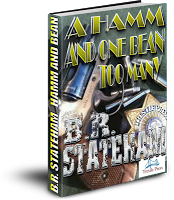 It's out.
A Hamm and One Bean Too Many
. The new series featuring Marissa Hamm and Mike Bean. Cops who, individually, are about as sweet to take as drinking a glass of strychnine with a pinch of cyanide in it.Hamm has a sharp-edge tongue that will carve up a person's soul with all the grace and civility of a bloody chain-saw. Bean has a reputation of losing partners--they either retire from the police force due to psychological trauma or from physical trauma. The guy has lost so many partners this way no one wants to work with him.
It's out.
A Hamm and One Bean Too Many
. The new series featuring Marissa Hamm and Mike Bean. Cops who, individually, are about as sweet to take as drinking a glass of strychnine with a pinch of cyanide in it.Hamm has a sharp-edge tongue that will carve up a person's soul with all the grace and civility of a bloody chain-saw. Bean has a reputation of losing partners--they either retire from the police force due to psychological trauma or from physical trauma. The guy has lost so many partners this way no one wants to work with him.
Necessity forces them to work together.
Think of a male/female version of a Laurel and Hardy gone psychotic. Or a Nick and Nora Charles' evil doppelganger. Whatever you think of them they're here to stay. This is the first of a new short-story series I'm writing for Trestle Press. I'm hoping it'll stick around for a while.
But there are a couple of other Trestle Press offerings you should know about. This little epublisher is beginning to expand rapidly. They've come up with this idea of creating a vast number of intriguing series featuring short stories. Series that can satisfy the full gamut of a reader's thirst for something new. I thought I might bring a few of the series to you.
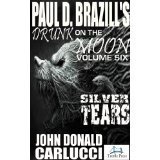 This is the newest addition to Paul D. Brazill's
Drunk On the Moon
series. Number seven or number eight . . . I can't remember. But I can tell you this. If Paul asked John Donald Carlucci to write his version of the private eye-turned-Werewolf character, Roman Dalton, well then . . . I can guarantee you it is going to be one damn fine story.The DOTM series is exactly what I am talking about when I said Trestle Press is innovative in finding, creating, and expanding a series through vibrant short story writing.
This is the newest addition to Paul D. Brazill's
Drunk On the Moon
series. Number seven or number eight . . . I can't remember. But I can tell you this. If Paul asked John Donald Carlucci to write his version of the private eye-turned-Werewolf character, Roman Dalton, well then . . . I can guarantee you it is going to be one damn fine story.The DOTM series is exactly what I am talking about when I said Trestle Press is innovative in finding, creating, and expanding a series through vibrant short story writing.
[image error] Next (to the right) up is something that is not out yet. I think they are looking toward the Thanksgiving/Christmas holidays for a release. But it will be soon. Someone mentioned to the Trestle Press gurus that they should create an anthology featuring an international flavor. Gather in writers/stories from all over the world who write noir/hardboiled. The call went out, and from what I hear, the response was overwhelming.So it's not just a one-shot deal. This too will be an on-going series. People all over the world write noir/hard boiled. Or . . . at least . . . their version of it. I think it would be 'nifty' to taste'em all and see how they might be similar, and distinctly different possibly, at the same time.
There are more, far more, Trestle Press writers I could have mentioned (probably got a few of them upset with me 'cause I didn't. But I promise; sooner or later you will be mentioned in here.)
Exciting times, Maynard. Nice to be involved with a young, vibrant, and growing publisher who has a vision about which direction epublishing should go. And they're open to new ideas and new writers. They're always open for new writers to submit their stuff.
That's a hint, by the way. Maybe if you write you should send something in. You can never tell . . .
Published on November 03, 2011 09:42
November 1, 2011
The Historical-Detective Master, I.J. Parker
Oh, my goodness! I'm a giddy as a junior high school-boy who's just kissed an honest-to-god girl for the first time. Ever! Today I get to present to you my interview with
I.J. Parker.
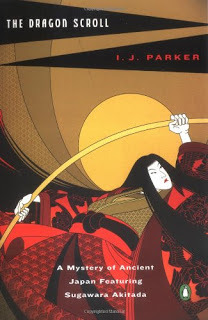 THE I.J. Parker!
THE I.J. Parker!
"Who?" you ask?
Well let me put it to you this way . . . if you love historical-detectives, you know who I.J. Parker is. She writes a series featuring Sugawara Akitada. Ninth Century Japan. Before the creation of the legendary samurai. . . or the geisha. Akitada is a minor official in the Heian Era imperial court. An honest and honorable man working along side corrupt court officials and scheming noblemen.
A man trapped in the rigid class system of his time, yet someone who has a genuine compassion for the lower classes as well as for his own. And someone who expects . . . quietly demands . . . that every one is entitled to justice and a fair shake when times go bad.
I.J. is a retired college professor of English and Languages. She is a strong personality whom I got to know in a web site called Crimespace. From there we've voiced opinions and comments back and forth over several topics others have raised on various issues regarding mysteries, writing mysteries, and the publishing industry in general. In the process developing a kind of long-distant friendship I've enjoyed immensely.
And . . . . by the way, if you haven't figured it out yet . . . I like strong personalities.
Coming up with six questions that didn't sound like a blubbering, clueless fan stumbling over his own tongue in an effort to impress one of his favorite writers, wasn't an easy task. I tried. That's all I can say. I tried.
So without further blubbering, let's get to the interview.
1. An intellectual, a respected college professor; someone adept in languages. The question has to be asked . . . what circumstances compelled you to try your hand in writing crime fiction? I read in an earlier interview you mentioned the decision was an accident. While looking up some poetry from the ancient Japanese Heian Age you discovered Sugawara Akitada. But how did we go from poetry to crime?
I've read mysteries almost all my life. Teaching Sophomore English and a few literature courses can get old after many years. There came a time when I decided to try my hand at writing a mystery. I was a fan of Robert Van Gulik's Judge Dee series already, having become absorbed in the culture of T'ang China, because the genre and his characters made time and place come alive. I had also recently studied Japanese literature while preparing a course in World Literature for our curriculum, and setting my novel in eleventh century Japan was a natural. The period was particularly rich in literary works. It wasn't the poetry, though, that I based my decision on, but prose. The world's first novel, Lady Murasaki's GENJI was written during this time.
2. Your character, Sugawara Akitada, is a minor figure in the imperial government. What attracted you to this character? Why pick a bureaucrat for a hero over, say, a monk or a more heroic figure?
I needed a protagonist who would have access to the nobility as well as the commoners. The class system was extremely rigid then. Akitada is a rounded character. A hero would not have served me. Akitada has glaring faults, but he tries and he is a man with a great sense of justice. A monk might have worked, but it seemed to me that historical mysteries have entirely too many monks already. As for an action hero: Akitada is trained in swordfighting, and he is frequently in situations where he has to use this skill.
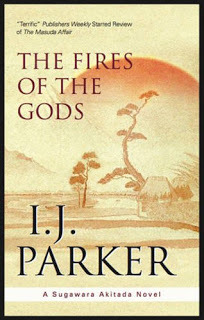 3. When you write your historical mysteries how important is it to weave in the political, social, cultural and mythological aspects of an ancient society into the story line?
3. When you write your historical mysteries how important is it to weave in the political, social, cultural and mythological aspects of an ancient society into the story line?
When I start a new novel, I check the actual events during that year. Frequently, this provides interesting material, as in THE CONVICT'S SWORD, where a smallpox epidemic in Kyoto affects Akitada's own family. My new novel weaves piracy on the Inland Sea into the plot. In ISLAND OF EXILES, an imperial prince is a prisoner because he tried to seize the succession, a fairly common occurrence in Heian times. As for social and cultural details: daily life was affected by customs, so they become a part of the narrative and of the characters' view of the world. Mythology plays a small part also, though Akitada is an unbeliever in a time when people were intensely superstitious. His sidekick Tora sometimes represents that aspect.
4. You once said in an interview you had a vision of Sugawara Akitada, at the end of the series, as an old bitter man, alone and forgotten. Why such a terrible end to a honorable character?
Yes. In "Akitada's First Case" and THE DRAGON SCROLL, you meet an Akitada who is filled with all sorts of idealistic notions. As time passes, he loses almost all of them. It stands to reason that a man who has dealt with crime and the corruption of the ruling class all of his life would become a cynical and disillusioned person in age. This sort of character change is just realism and not such a terrible thing. He will remain an honorable man.
5. In reading the Akitada novels I am constantly struck by the concepts of Order over Chaos. Of Intellect over Superstition. Of Law over Anarchy. Are these motifs that much of an interest to you?
A case of the chicken or the egg? I probably rely so heavily on these because that is part of my character. And so being a fan of mysteries may also come from that. There is little enough in modern literature that gives readers, young and old, any of the ideals to live up to that earlier generations found in their own reading. And yes, such concepts can become themes. The new Akitada novel (DEATH ON AN AUTUMN RIVER) deals with appearance vs. reality; people may not be as they appear and preconceptions about right and wrong may be dangerous.
6. What is in store for your fans once the Akitada series comes to an end? Are there other characters percolating around in your conscious? Historical figures or something/someone more modern? Or will we all be fortunate to see the Akitada series continue indefinitely.
The series is set to continue indefinitely at this point. I may, from time to time, also dabble in something else. A Japanese swashbuckler is possible. Also a set of short stories based on Hiroshige's prints. And of course, THE HOLLOW REED trilogy is available for readers of historical fiction. Far back in my mind is a modern police procedural set in a small German town.
////
If you like a good mystery, you should the Sugawara Akitada novels. And you should notch I.J. Parker's name up on your list of favorite authors. She's that good.
 THE I.J. Parker!
THE I.J. Parker!"Who?" you ask?
Well let me put it to you this way . . . if you love historical-detectives, you know who I.J. Parker is. She writes a series featuring Sugawara Akitada. Ninth Century Japan. Before the creation of the legendary samurai. . . or the geisha. Akitada is a minor official in the Heian Era imperial court. An honest and honorable man working along side corrupt court officials and scheming noblemen.
A man trapped in the rigid class system of his time, yet someone who has a genuine compassion for the lower classes as well as for his own. And someone who expects . . . quietly demands . . . that every one is entitled to justice and a fair shake when times go bad.
I.J. is a retired college professor of English and Languages. She is a strong personality whom I got to know in a web site called Crimespace. From there we've voiced opinions and comments back and forth over several topics others have raised on various issues regarding mysteries, writing mysteries, and the publishing industry in general. In the process developing a kind of long-distant friendship I've enjoyed immensely.
And . . . . by the way, if you haven't figured it out yet . . . I like strong personalities.
Coming up with six questions that didn't sound like a blubbering, clueless fan stumbling over his own tongue in an effort to impress one of his favorite writers, wasn't an easy task. I tried. That's all I can say. I tried.
So without further blubbering, let's get to the interview.
1. An intellectual, a respected college professor; someone adept in languages. The question has to be asked . . . what circumstances compelled you to try your hand in writing crime fiction? I read in an earlier interview you mentioned the decision was an accident. While looking up some poetry from the ancient Japanese Heian Age you discovered Sugawara Akitada. But how did we go from poetry to crime?
I've read mysteries almost all my life. Teaching Sophomore English and a few literature courses can get old after many years. There came a time when I decided to try my hand at writing a mystery. I was a fan of Robert Van Gulik's Judge Dee series already, having become absorbed in the culture of T'ang China, because the genre and his characters made time and place come alive. I had also recently studied Japanese literature while preparing a course in World Literature for our curriculum, and setting my novel in eleventh century Japan was a natural. The period was particularly rich in literary works. It wasn't the poetry, though, that I based my decision on, but prose. The world's first novel, Lady Murasaki's GENJI was written during this time.
2. Your character, Sugawara Akitada, is a minor figure in the imperial government. What attracted you to this character? Why pick a bureaucrat for a hero over, say, a monk or a more heroic figure?
I needed a protagonist who would have access to the nobility as well as the commoners. The class system was extremely rigid then. Akitada is a rounded character. A hero would not have served me. Akitada has glaring faults, but he tries and he is a man with a great sense of justice. A monk might have worked, but it seemed to me that historical mysteries have entirely too many monks already. As for an action hero: Akitada is trained in swordfighting, and he is frequently in situations where he has to use this skill.
 3. When you write your historical mysteries how important is it to weave in the political, social, cultural and mythological aspects of an ancient society into the story line?
3. When you write your historical mysteries how important is it to weave in the political, social, cultural and mythological aspects of an ancient society into the story line?
When I start a new novel, I check the actual events during that year. Frequently, this provides interesting material, as in THE CONVICT'S SWORD, where a smallpox epidemic in Kyoto affects Akitada's own family. My new novel weaves piracy on the Inland Sea into the plot. In ISLAND OF EXILES, an imperial prince is a prisoner because he tried to seize the succession, a fairly common occurrence in Heian times. As for social and cultural details: daily life was affected by customs, so they become a part of the narrative and of the characters' view of the world. Mythology plays a small part also, though Akitada is an unbeliever in a time when people were intensely superstitious. His sidekick Tora sometimes represents that aspect.
4. You once said in an interview you had a vision of Sugawara Akitada, at the end of the series, as an old bitter man, alone and forgotten. Why such a terrible end to a honorable character?
Yes. In "Akitada's First Case" and THE DRAGON SCROLL, you meet an Akitada who is filled with all sorts of idealistic notions. As time passes, he loses almost all of them. It stands to reason that a man who has dealt with crime and the corruption of the ruling class all of his life would become a cynical and disillusioned person in age. This sort of character change is just realism and not such a terrible thing. He will remain an honorable man.
5. In reading the Akitada novels I am constantly struck by the concepts of Order over Chaos. Of Intellect over Superstition. Of Law over Anarchy. Are these motifs that much of an interest to you?
A case of the chicken or the egg? I probably rely so heavily on these because that is part of my character. And so being a fan of mysteries may also come from that. There is little enough in modern literature that gives readers, young and old, any of the ideals to live up to that earlier generations found in their own reading. And yes, such concepts can become themes. The new Akitada novel (DEATH ON AN AUTUMN RIVER) deals with appearance vs. reality; people may not be as they appear and preconceptions about right and wrong may be dangerous.
6. What is in store for your fans once the Akitada series comes to an end? Are there other characters percolating around in your conscious? Historical figures or something/someone more modern? Or will we all be fortunate to see the Akitada series continue indefinitely.
The series is set to continue indefinitely at this point. I may, from time to time, also dabble in something else. A Japanese swashbuckler is possible. Also a set of short stories based on Hiroshige's prints. And of course, THE HOLLOW REED trilogy is available for readers of historical fiction. Far back in my mind is a modern police procedural set in a small German town.
////
If you like a good mystery, you should the Sugawara Akitada novels. And you should notch I.J. Parker's name up on your list of favorite authors. She's that good.
Published on November 01, 2011 09:11
October 28, 2011
A Talk With Julia
[image error]
Okay boyos! Time to talk to a fair wee lass from Ireland--residing-in-Canada, Julia Madeleine. I have to come out and say this; the lady makes me slightly jealous. She is, among other things, one of the writers in the
Drunk On The Moon Series
, and her take on the PI-turned-Werewolf, Roman Dalton, was excellent.
But that's to be expected from Julia. She has, like so many of us, been writing for years. For her it's been writing as a career in the beginning and before other opportunities came along--and that urge to write has stayed with her. Now she is back creating some really great stories and novels and she's showing the universe that dark, twisted, murderous minds can be found in the feminine form as much as in the male form.
And, like I've always said, "If you really want to torture a man, just ask a woman to . . . ."Er . . . . never mind.
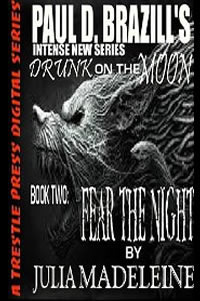 Personally I am as happy as a six year old kid playing in a summer rain storm in the deepest mud hole I could fine knowing that Julia is a fellow
Trestle Press
writer. That growing epublisher is making waves and expanding exponentially and is only going to grow bigger and more interesting as the months and years roll by. It's good to see that both Julia and I are one of the original authors to come aboard.I decided to ask Julia the traditional six questions. Plum her thoughts, as it were, on what and how she writes. Dig into her sick (and I say that with the most loving respect, Julia!) little mind in an effort to understand what terrors she like to bring to her fictional perps. So, without further ado, lets get to it.
Personally I am as happy as a six year old kid playing in a summer rain storm in the deepest mud hole I could fine knowing that Julia is a fellow
Trestle Press
writer. That growing epublisher is making waves and expanding exponentially and is only going to grow bigger and more interesting as the months and years roll by. It's good to see that both Julia and I are one of the original authors to come aboard.I decided to ask Julia the traditional six questions. Plum her thoughts, as it were, on what and how she writes. Dig into her sick (and I say that with the most loving respect, Julia!) little mind in an effort to understand what terrors she like to bring to her fictional perps. So, without further ado, lets get to it.
1. A woman who loves the dark hard boiled/noir life style. How did this come about?
Probably all the drugs my mother did in the 60s while I was in utero. Or maybe it was the beatings I took as a kid by my two older brothers. I had to develop my scheming skills early on to learn how to pit one against the other and protect myself. But really I think it was a regular diet of old horror movies that warped my childhood brain. I owe it to Alfred Hitchcock.
2. Are you more into noir or hard boiled or horror? Meaning; do you write stories where the character cannot possibly get out of his/her situation unscathed (noir)--or where at the end of it all, the main character survives (hard boiled).
I think I like psycho-noir best. Where you have a main character like the protagonist, being mentally unhinged, yet see themselves as perfectly justified in their dastardly deeds. I like psychological suspense. Whether or not the main character survives I think has more to do with the particular story that's being told. I don't always write happy little endings where everything gets tied up in a neat little bow, sometimes a bleak ending is what the story needs, sometimes not. But I like it all: noir hard boiled (over easy with a side of toast) and horror.
3.Our publisher, Trestle Press, loves to do a continuing series of short stories with their writers. Are you doing a series? And what/who resides therein?
Yes, I'm doing The Devil's Music series. It's about Sadie, a femme fatale character who is actually the daughter of the devil. She has an insatiable appetite for music. And she enjoys time travelling to different eras, collecting the souls of all the great musical legends who have signed a contract with her. It's lots of fun.
4. Describe your writing habits--do you write by fits and starts? Or are you more methodical and planned?
I've been both. But I find planning a novel works best. Nailing down an outline first, writing a quick draft with an emphasis on getting down the main plot points and then going back in subsequent drafts and refining it, expanding on the main ideas. It helps to know the direction of the story and what you want to accomplish. Writing short stories is a lot more simple.
5. Your favorite authors, who are they and how did they influence you? And . . . do you base your writing style off any one of your favorites? Or do you blend all of them into an amalgam you call your own?
Growing up I read nothing but horror, King, Koontz, Poe, Anne Rice. I think they were very influential as they've been with countless writers. In college I was encouraged to focus on literary fiction. One of my instructors was fond of referring to writers who penned genre fiction as hacks, which I always thought was narrow-minded. So I read a lot literary fiction back then: Margaret Laurence, Michael Ondaatje, Alice Munro, Joyce Carol Oates. I'm sure they've influenced me. I love Janet Fitch, Evelyn Lau, and Mary Gaitskill. As for crime fiction, James M. Cain, Stuart Neville, Jenn Ashworth, Chuck Hogan, are some of my favourites. I don't try to write like anyone else, I prefer to develop my own style but I'm definitely influenced by some of the writers I admire.
6. When it comes to the human race, are you a pessimist or an optimist? And does either one seep into your writing?
[image error] I'm an incurable optimist. My mother always said, "Count your blessings, not your sorrows". Words I live by. As far as my writing, I don't know, I write about some pretty fucked up people, characters that inhabit the dark side. Maybe my writing is just a medium to let the demons out so I can stay focused on living in joy. I know that when I'm not writing, I'm less happy.
NO ONE TO HEAR YOU SCREAM, available now on Amazon. THE TRUTH ABOUT SCARLET ROSE, scheduled for release Dec. 2011. Visit Julia's website for updates http://juliamadeleine.com/
So there you have. One talented writer. One should should go out and discover for yourself. You won't be disappointed.

But that's to be expected from Julia. She has, like so many of us, been writing for years. For her it's been writing as a career in the beginning and before other opportunities came along--and that urge to write has stayed with her. Now she is back creating some really great stories and novels and she's showing the universe that dark, twisted, murderous minds can be found in the feminine form as much as in the male form.
And, like I've always said, "If you really want to torture a man, just ask a woman to . . . ."Er . . . . never mind.
 Personally I am as happy as a six year old kid playing in a summer rain storm in the deepest mud hole I could fine knowing that Julia is a fellow
Trestle Press
writer. That growing epublisher is making waves and expanding exponentially and is only going to grow bigger and more interesting as the months and years roll by. It's good to see that both Julia and I are one of the original authors to come aboard.I decided to ask Julia the traditional six questions. Plum her thoughts, as it were, on what and how she writes. Dig into her sick (and I say that with the most loving respect, Julia!) little mind in an effort to understand what terrors she like to bring to her fictional perps. So, without further ado, lets get to it.
Personally I am as happy as a six year old kid playing in a summer rain storm in the deepest mud hole I could fine knowing that Julia is a fellow
Trestle Press
writer. That growing epublisher is making waves and expanding exponentially and is only going to grow bigger and more interesting as the months and years roll by. It's good to see that both Julia and I are one of the original authors to come aboard.I decided to ask Julia the traditional six questions. Plum her thoughts, as it were, on what and how she writes. Dig into her sick (and I say that with the most loving respect, Julia!) little mind in an effort to understand what terrors she like to bring to her fictional perps. So, without further ado, lets get to it.
1. A woman who loves the dark hard boiled/noir life style. How did this come about?
Probably all the drugs my mother did in the 60s while I was in utero. Or maybe it was the beatings I took as a kid by my two older brothers. I had to develop my scheming skills early on to learn how to pit one against the other and protect myself. But really I think it was a regular diet of old horror movies that warped my childhood brain. I owe it to Alfred Hitchcock.
2. Are you more into noir or hard boiled or horror? Meaning; do you write stories where the character cannot possibly get out of his/her situation unscathed (noir)--or where at the end of it all, the main character survives (hard boiled).
I think I like psycho-noir best. Where you have a main character like the protagonist, being mentally unhinged, yet see themselves as perfectly justified in their dastardly deeds. I like psychological suspense. Whether or not the main character survives I think has more to do with the particular story that's being told. I don't always write happy little endings where everything gets tied up in a neat little bow, sometimes a bleak ending is what the story needs, sometimes not. But I like it all: noir hard boiled (over easy with a side of toast) and horror.
3.Our publisher, Trestle Press, loves to do a continuing series of short stories with their writers. Are you doing a series? And what/who resides therein?
Yes, I'm doing The Devil's Music series. It's about Sadie, a femme fatale character who is actually the daughter of the devil. She has an insatiable appetite for music. And she enjoys time travelling to different eras, collecting the souls of all the great musical legends who have signed a contract with her. It's lots of fun.
4. Describe your writing habits--do you write by fits and starts? Or are you more methodical and planned?
I've been both. But I find planning a novel works best. Nailing down an outline first, writing a quick draft with an emphasis on getting down the main plot points and then going back in subsequent drafts and refining it, expanding on the main ideas. It helps to know the direction of the story and what you want to accomplish. Writing short stories is a lot more simple.
5. Your favorite authors, who are they and how did they influence you? And . . . do you base your writing style off any one of your favorites? Or do you blend all of them into an amalgam you call your own?
Growing up I read nothing but horror, King, Koontz, Poe, Anne Rice. I think they were very influential as they've been with countless writers. In college I was encouraged to focus on literary fiction. One of my instructors was fond of referring to writers who penned genre fiction as hacks, which I always thought was narrow-minded. So I read a lot literary fiction back then: Margaret Laurence, Michael Ondaatje, Alice Munro, Joyce Carol Oates. I'm sure they've influenced me. I love Janet Fitch, Evelyn Lau, and Mary Gaitskill. As for crime fiction, James M. Cain, Stuart Neville, Jenn Ashworth, Chuck Hogan, are some of my favourites. I don't try to write like anyone else, I prefer to develop my own style but I'm definitely influenced by some of the writers I admire.
6. When it comes to the human race, are you a pessimist or an optimist? And does either one seep into your writing?
[image error] I'm an incurable optimist. My mother always said, "Count your blessings, not your sorrows". Words I live by. As far as my writing, I don't know, I write about some pretty fucked up people, characters that inhabit the dark side. Maybe my writing is just a medium to let the demons out so I can stay focused on living in joy. I know that when I'm not writing, I'm less happy.
NO ONE TO HEAR YOU SCREAM, available now on Amazon. THE TRUTH ABOUT SCARLET ROSE, scheduled for release Dec. 2011. Visit Julia's website for updates http://juliamadeleine.com/
So there you have. One talented writer. One should should go out and discover for yourself. You won't be disappointed.
Published on October 28, 2011 06:32



